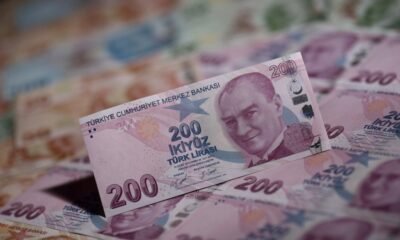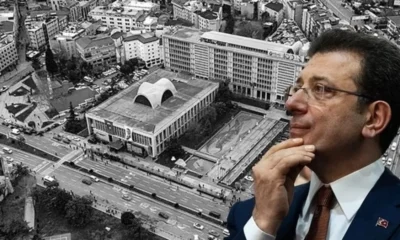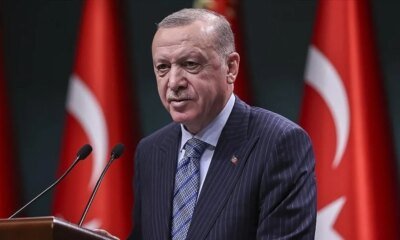Economy
Despite shocks, Turkish economic program not shaken: Erdoğan
The structural resilience of the Turkish economy has been strengthened with the program the government is implementing, President Recep Tayyip Erdoğan said on Monday.
He also said that the program “has not been shaken” despite the shocks, while praising the continued growth of the economy at the event in Istanbul.
“Thanks to the program, we have strengthened the structural resilience of our economy. Despite all kinds of shocks experienced, especially in the past three months, the program has not been shaken,” Erdoğan said.
Delivering a speech at the 32nd Ordinary General Assembly of the Turkish Exporters Assembly (TIM) and Export Champions Award Ceremony, the president also said they expected to see inflation figures in the 20s by the end of the year.
Annual inflation in Türkiye eased to 35.4% in May, touching the lowest level since late 2021 amid a continued disinflation period in the face of tight monetary conditions.
“Our reserves are starting to increase again. Confidence in the Turkish lira is increasing. Inflation has been declining uninterruptedly for a year,” he said.
“Inflation in May is at its lowest level in the last three and a half years. We aim to see figures in the 20s by the end of the year,” he added.
Turkish central bank targets inflation to drop to 24% by the end of 2025 with a wider window range between 19% and 29%. The officials have also repeatedly conveyed the aim to see the consumer price index (CPI) in the 20s range.
The data for June, which is due to be announced later this week, is likely to show the rate easing further, according to the latest polls.
Moreover, touching upon exports, Erdoğan said that 2024 was “a record year in terms of exports.”
“We broke a record with $262 billion in exports. The number of companies exporting over $1 billion last year increased to 18. We continue on our path with the same rhythm in 2025,” he continued.
“Our exports increased by 2.7% in May. In the January-May period, goods exports increased by 3.5%. We are also doing quite well in terms of service exports,” he added.
Defense, drone exports
At the same time, he drew attention to medium-high and high-tech product exports as well as the success in the shipments from the defense and aerospace sector.
“The increase in Türkiye’s exports has changed not only in quantity but also in quality. In 2024, medium-high and high-tech product exports exceeded $101 billion. We continue to work to expand our exports,” said Erdoğan.
“In 2024, we provided TL 24.7 billion worth of resources to our companies to support exports of goods and services. Factors such as increasing geopolitical tensions have reminded us once again that we need to boost the geographical diversity of our exports. We aim to lift our exports to distant countries to $50 billion and the share of the Organisation of the Islamic Cooperation (OIC) countries in our total exports to 30% by 2028,” he noted.
“We have managed to become one of the leading countries in armed and unarmed unmanned aerial vehicles (UAVs). Turkish companies produce two out of every three UAVs sold in the world. We have become a global brand in armored land vehicles. God willing, we will achieve the success we have in UAVs in warplanes,” he added.
He also recalled that defense exports reached the volume of $7.1 billion, referring to last year’s figures, which marked a new record for the sector.
As part of his remarks, he also mentioned that the Turkish economy expanded by 3.2% in 2024, also adding that it grew by 2% in the first quarter. “We have achieved uninterrupted growth for 19 quarters,” he said.
Speaking at the same event, Trade Minister Ömer Bolat stated that exports continued to increase despite major challenges.
“In five out of the first six months of the year, we have achieved more goods exports than in the same months of the previous year. We continued to increase in service exports as of the first four months,” he said.
Starting his speech, Bolat recalled that the 2000s, which started with great excitement and hope, were subject to major conflicts and crises such as the world financial crisis, global pandemic, wars and energy wars. He, however, expressed that Türkiye maintained its political stability under the leadership of President Erdoğan despite being in the middle of these crises and the ring of fire, also suggesting that major developments were made in industry, agriculture, services and trade with the reforms in the economy, successes in foreign policy and major projects implemented.
He said that Türkiye’s national income has increased sixfold in dollar terms in the last 22 years, reaching $1.37 trillion and that the national income per capita has increased fourfold, approaching $16,000. Thus, he said Türkiye has risen to the league of high-income countries according to the World Bank.
The minister also said that the annualized exports have reached $265.5 billion as of the end of May.
“Last year, we generated a total of $377 billion in foreign currency. Our president has set a target of at least $390 billion for this year, and with God’s permission, we will complete this by the end of the year,” he maintained.
Top exporters
At the event, the companies that made the highest contribution to Türkiye’s total exports of $377 billion in goods and services last year received their awards.
In services exports, the crown belonged to the flag carrier Turkish Airlines (THY), which was followed by other companies mostly operating in the aviation industry, including Pegasus, Güneş Ekspres Aviation Inc., IGA Airport Operation Inc., and TAV Airports Holding Inc.
The top 10 companies that exported the most goods in 2024 were listed as Ford Automotive, Toyota Automotive Industry Türkiye Inc., Türkiye Petroleum Refineries Inc. (Tüpraş), Kibar Foreign Trade Inc., Star Refinery, TGS Foreign Trade Inc., Oyak-Renault Automobile Factories, Vestel, Arçelik and Baykar Makina.
Moreover, in the e-export category, Trendyol Group ranked first, and was followed by Asır Group Export Inc. and Modanisa Electronic Retailing and Trading Inc.
The event in Istanbul was also attended by Industry and Technology Minister Mehmet Fatih Kacır, Youth and Sports Minister Osman Aşkın Bak and TIM head Müstafa Gültepe.
Economy
Trump to lift U.S. sanctions on Syria, keeps measures on Assad
President Donald Trump will sign an executive order Monday to terminate U.S. sanctions on Syria, White House Press Secretary Karoline Leavitt told reporters, marking a major shift in Washington’s approach following more than a decade of civil war in the country.
The decision fulfills a pledge Trump made in May to unwind broad economic measures imposed during the Assad regime, aiming to support Syria’s “path to stability and peace,” Leavitt said during a press briefing.
“The order will remove sanctions on Syria while maintaining sanctions on the former President Assad, his associates, human rights abusers, drug traffickers, persons linked to chemical weapons activities, ISIS and their affiliates, and Iranian proxies,” she said.
“This is again an action that the president promised and shocked the world with in Saudi Arabia, because he’s committed to supporting a Syria that is stable, unified, and at peace with itself and its neighbors,” Leavitt added.
Trump first announced the policy shift at an investment forum in Riyadh last month, where he criticized the “brutal and crippling” sanctions. The next day, he met with Syrian President Ahmed al-Sharaa — the first meeting between U.S. and Syrian leaders in 25 years.
Al-Sharaa, who led anti-regime forces during Syria’s conflict, assumed the presidency in late January following the ouster of Bashar Assad. Assad fled to Russia on Dec. 8, 2024, bringing an end to the Baath Party’s decades-long rule, which began in 1963.
Economy
Türkiye’s foreign trade gap at nearly $6.65B in May
Türkiye’s foreign trade deficit stood at nearly $6.65 billion in May, official data from the Turkish Statistical Institute (TurkStat) revealed on Monday.
The country’s exports totaled $24.82 billion in the month, up 2.6%, while imports amounted to $31.46 billion, up 2.7%, TurkStat said.
Excluding energy and non-monetary gold, the foreign trade deficit was $1.89 billion in the month.
In May, the ratios of the manufacturing industries products sector, agriculture, forestry and fishing sector, and the mining and quarrying sector in total exports were 95%, 3%, and 1.4%, respectively.
High-tech’s share in the manufacturing sector rose 7% to 4%, and medium-high tech’s share increased 10.8% to 38.9% year-over-year in May.
The top destination countries for Turkish exports were Germany, with $2.1 billion, followed by the U.K., with $1.52 billion, and the U.S., with $1.51 billion, the data showed.
China was the top source of imports to Türkiye with $4.31 billion, followed by Russia with $3.26 billion and Germany with $2.69 billion.
In January through May, the country’s exports totaled $110.9 billion, up 3.4%, and imports were at $152.16 billion, up 5.8%.
The foreign trade deficit for the five months was $41.25 billion, representing a 12.7% increase compared to January-May 2024.
Economy
Investors shift focus to Europe amid US trade war uncertainty
Peter Roessner is feeling both sides of U.S. President Donald Trump’s shaky trade war.
While tariff risks mean the CEO of Luxembourg-based hydrogen firm H2Apex can no longer rely on U.S. suppliers for its more than 200-million-euro ($235-million) project in Lubmin, Germany, investor interest in European projects is rising.
“Investors in the hydrogen sector are now focusing more on the European market due to the absolute uncertainty and planning insecurity in the USA,” he told Reuters, adding this included both local and U.S. players.
“The framework conditions in Europe are not ideal, but they are stable.”
Roessner’s comments are indicative of a trend that has taken hold in recent months: Investors and companies are increasingly turning to Europe, drawn by an infrastructure- and defense-led spending push that offers stability at a time when Trump’s erratic tariff policies have made the U.S. market a less safe bet, according to more than a dozen interviews with executives and fund managers.
The shift has also been fueled by Trump’s tendency to make sweeping tariff threats and announcements that are then often delayed or revised, and to issue executive orders that have tested the limits of his presidential power.
“The U.S. is coming from a very capital market-friendly and stable environment. Now there is political intervention and also an attempt to expand power,” said Christoph Witzke, who heads the CIO office at Deka, one of Germany’s largest investment funds.
“This creates uncertainty that some kind of intervention … could come at any time,” he said, adding that Europe had become the center of attention in the most recent investor conferences as a result. With a July 9 deadline for a trade deal less than two weeks away – and Trump saying he will impose 50% tariffs on all EU goods without a deal – investors have started shifting their money.
Data from LSEG’s Lipper Funds show that more than $100 billion has flowed into European equity funds so far this year – up threefold from the same period last year – while outflows from the U.S. more than doubled to nearly $87 billion.
“All that is an indication that at least market forces, investors, those who move real money around, actually see value and have confidence in Europe,” ECB President Christine Lagarde said earlier this month. This shift in focus was also illustrated by the weak market debut of Holcim’s North American spin-off, Amrize, in late June. Amrize was announced to much fanfare in early 2024, at a time when the lure of U.S. valuations also excited some of its rivals.
In contrast, the share price of Holcim itself, now squarely focused on Europe, Latin America and North Africa, soared 15%.
Sentiment can quickly turn
Siemens Energy, which makes more than a fifth of its sales in the U.S., has noted a shift in sentiment, finance chief Maria Ferraro said, on the back of a recent U.S. road show and an 84% rise in the group’s share price year-to-date.
Apart from the improved market outlook, additional investments are also crucial in efforts to revive the EU’s economy and narrow its competitiveness gap compared to other regions, most notably China and the United States.
Closely watched foreign direct investment flows into Germany, the bloc’s largest economy, more than doubled to 46 billion euros in the first four months of 2025, according to the most recent data from the Bundesbank, marking the highest level since 2022.
It also shows that German companies even withdrew money from the U.S. in three of the first four months of the year, with their balance of foreign direct investments in April at a negative 2.38 billion euros.
Negative balances emerge when companies either divest more than they invest in a foreign country or decide against extending credit lines to local counterparts.
But the picture is not all rosy, with several investors pointing out that Europe is now under pressure to act faster, create better regulation and make good on its spending pledges.
“This sentiment can quickly turn again. This should be both a warning and an incentive to use the momentum now and consistently implement the planned agenda,” said Stefan Wintels, head of German state-backed lender KfW.
This chimes with comments from Hajo Kroesche, a partner at private equity firm Altor, who said, “The window of opportunity will not stay open forever” for Europe to attract capital.
Having recently traveled to Qatar, Abu Dhabi and Saudi Arabia, Deutsche Bank CEO Christian Sewing last week said investor interest in Europe and Germany was huge, while still cautioning that conditions needed to be stable in the long term.
“These are not people who invest within two days. But of course, they see what is happening in the world right now.”
Economy
ING to cut 230 posts as it says it has ‘too many’ managing directors
Dutch banking giant ING said on Monday it planned job cuts focused on senior staff, saying there are just too many of them, several media reports, citing the bank, said.
The lender plans to eliminate 230 roles across its wholesale banking division, Bloomberg reported, referring to a statement on Monday. The cuts “will be focused on Directors and Managing Directors in commercial, front office roles,” as the lender has “too many senior roles,” it said.
Shares in ING were 2.1% lower at 11:15 a.m. in Amsterdam. The stock is up about 23% this year to date, compared with about 30% for the wider European banking sector.
The bank said the cuts were prompted by a combination of “market circumstances” and the goal of “re-balancing” staff. The cuts will be split proportionally across its locations, it said.
Economy
Canada scraps digital services tax to advance US trade talks
Canada scrapped its digital services tax targeting U.S. technology firms late on Sunday, only hours before it was due to take effect, in what appeared to be a bid to advance stalled trade negotiations with its southern neighbor.
Canadian Prime Minister Mark Carney and U.S. President Donald Trump will resume trade negotiations in order to agree on a deal by July 21, Canada’s finance ministry said in a statement.
Trump abruptly called off trade talks on Friday over the tax targeting U.S. technology firms, saying that it was a “blatant attack.”
He reiterated his comments on Sunday, pledging to set a new tariff rate on Canadian goods within the next week, which threatened to push U.S.-Canada relations back into chaos after a period of relative calm.
The breakdown in trade talks comes after the two leaders met at the G-7 in mid-June and Carney said they had agreed to wrap up a new economic agreement within 30 days.
Canada’s planned digital tax was 3% of the digital services revenue a firm takes in from Canadian users above $20 million in a calendar year, and payments were to be retroactive to 2022.
It would have impacted U.S. technology firms, including Amazon, Meta, Alphabet’s Google and Apple, among others.
Monday collection will be halted, Canada’s finance ministry statement said, and Finance Minister Francois-Philippe Champagne will bring forward legislation to rescind the Digital Services Tax Act.
“The DST was announced in 2020 to address the fact that many large technology companies operating in Canada may not otherwise pay tax on revenues generated from Canadians,” the statement said. “Canada’s preference has always been a multilateral agreement related to digital services taxation.”
Stock index futures rose after the news that the digital tax will be rescinded, and the bullish sentiment spilled over into Asian markets.
Canada is the second-largest U.S. trading partner after Mexico, and the largest buyer of U.S exports. It bought $349.4 billion of U.S. goods last year and exported $412.7 billion to the U.S., according to U.S. Census Bureau data.
The Biden administration had requested trade dispute settlement consultations over the tax in 2024, saying it was inconsistent with Canada’s North American trade deal obligations.
Canada had escaped Trump’s broad tariffs imposed in April but faces 50% duties on steel and aluminum.
Economy
Chinese factory activity improves in June, but still in contraction
Chinese factory activity improved slightly in June after U.S. President Donald Trump agreed to delay imposing higher tariffs on imports from China for 90 days, but overall activity was still stuck in contraction, according to a survey released Monday.
The purchasing managers index (PMI), which reflects new orders and other measures, rose to 49.7 from 49.5 in May, the National Bureau of Statistics reported. That’s on a scale of 0 to 100, where 50 and above shows expansion.
Other reports showed similar trends in Japan and Korea.
Trump has said he’s not planning to extend the 90-day pause on tariffs on most nations beyond July 9. The delay for imposing much higher tariffs on China, agreed to in early May, expires about a month later.
The hiatus for tariffs brought a revival of manufacturing activity as companies and individuals rushed to take advantage of lower import duties. But that mainly helped large manufacturers, with small and mid-size companies’ output still contracting. Hiring also fell.
New export orders and exports also remained below the 50-level that marks expansion.
In Japan, manufacturing output edged 0.5% higher in May, well below analysts’ estimates for a 3.5% increase.
“The subdued rise in industrial production in May means that firms were not benefitting from sky-high U.S. tariffs on Chinese imports, and their production forecasts point to continued weakness,” Marcel Thieliant of Capital Economics said in a report.
South Korea’s government reported that its “all industry” measure of output fell 2.9% from a year earlier in May, with production of computer chips falling 2%. Production of vehicles fell 2.3% year-on-year, after falling 4.1% in April.
In an interview with Fox News Channel’s “Sunday Morning Futures,” Trump said he’s not planning to extend a 90-day pause on tariffs on most nations beyond July 9. The delay for imposing much higher tariffs on China, agreed to in early May, expires about a month later.
Trump said his administration will notify countries that the trade penalties will take effect unless there are deals with the U.S. He had played down the deadline at a White House news conference Friday by noting how difficult it would be to work out separate deals with each nation. The administration had set a goal of reaching 90 trade deals in 90 days.
Despite a recent trade deal with Beijing over rare earth exports from China, establishing a fairer relationship will require significant tariffs.
Details of the latest agreement to de-escalate trade tensions are scarce, and significant issues between the world’s two biggest economies remain unresolved.
“I think getting along well with China is a very good thing,” Trump said. “China’s going to be paying a lot of tariffs, but we have a big (trade) deficit, they understand that.”
-

 Daily Agenda3 days ago
Daily Agenda3 days ago32 arrests in doner operation connected to FETÖ
-

 Daily Agenda3 days ago
Daily Agenda3 days agoCrypos were deciphering – Breaking News
-

 Politics3 days ago
Politics3 days agoTurkish mosques in Germany under threat of increasing attacks
-

 Economy3 days ago
Economy3 days agoTrump halts US-Canada trade talks over digital tax on tech firms
-

 Economy1 day ago
Economy1 day agoTürkiye advances toward exit from FX-protected scheme
-

 Daily Agenda3 days ago
Daily Agenda3 days agoMinister Ali Yerlikaya explained! Operation for Cyber Crimes in 48 provinces: 284 suspects were caught in 1 week
-

 Daily Agenda2 days ago
Daily Agenda2 days ago36 confessors in corruption investigation! Imamoglu’s key men told one by one: the bench broke down like this
-

 Daily Agenda2 days ago
Daily Agenda2 days agoPresident Erdoğan listed the gospels one after the other! “Credit opportunities up to 10 million with 10 years of maturity”




